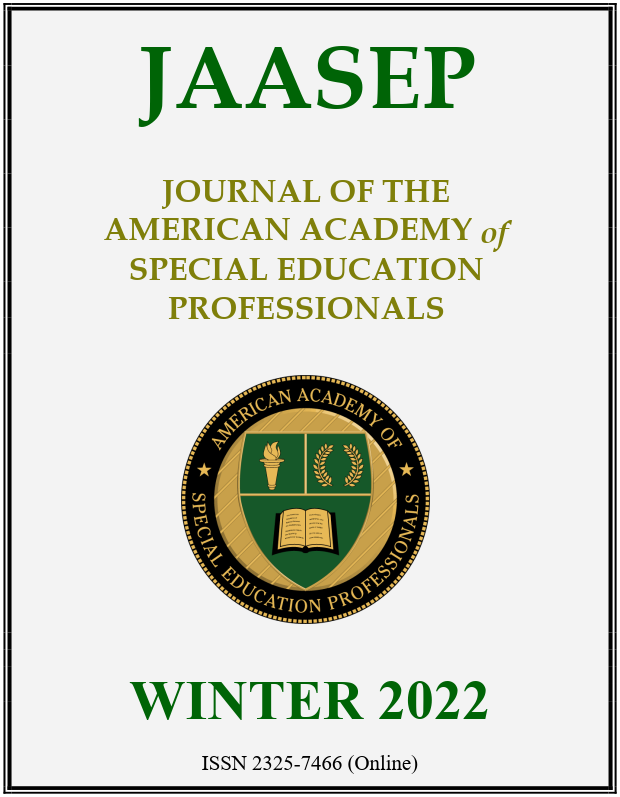Collaborative Inclusive Programs: Influences of Administrators and Teacher Leaders
Brantlinger, E., Jimenez, R., Klingner, J., Pugach, M., & Richardson, V. (2005). Qualitativestudies in special education. Exceptional Children, 71(2), 195-207. DOI: https://doi.org/10.1177/001440290507100205
Carlson, J.A. (2010). Avoiding traps in member checking. The Qualitative Report 15(5). 1102-1113
Clandinin, D. J., Long, J., Schaefer, L., Downey, C. A., Steeves, P., Pinnegar, E., . . . Wnuk, S.(2015). Early career teacher attrition: Intentions of teachers beginning. Teaching Education, 26(1), 1–16. doi:10.1080/10476210.2014.996746 DOI: https://doi.org/10.1080/10476210.2014.996746
DaFonte, M.A. & Barton-Arwood, S. M. (2017) Collaboration of general and special education teachers: Perspectives and strategies. Intervention in School and Clinic. 53(2), 99-109. DOI: https://doi.org/10.1177/1053451217693370
Gaikhorst,l., März, V., du Pré, R., Geijsel, F (2019). Workplace conditions for successful teacher professional development: School principals' beliefs and practices. European Journal of Education. Vol. 54 Issue 4, p605-620. 16p. DOI: https://doi.org/10.1111/ejed.12366
Hamilton-Jones, B. M. & Vail C. O. (2014). Preparing special educators for collaboration in the classroom: Pre-service teachers’ beliefs and perspectives. International Journal of Special Education, 29,76-86.
Hargreaves, A. (2019). Teacher Collaboration: 30 years of research on its nature, limitations, and effects. Teachers and Teaching. 25(5), 603-621 DOI: https://doi.org/10.1080/13540602.2019.1639499
Hargreaves, A., & O’Connor, M. T. (2018). Solidarity with solidity: The case for collaborative professionalism. Phi Delta Kappan, 100(1), 20–24 DOI: https://doi.org/10.1177/0031721718797116
Johnson, J., Ohlson, M., & Shope, S. (2018). Dramatic changes in rural America and the implications for special education programing: A descriptive and comparative analysis. Rural Special Education Quarterly, 37(3), 140-149. DOI: https://doi.org/10.1177/8756870518771381
Jortveit, M. & Kovač, V. (2021) Co-teaching that works: special and general educators’ perspectives on collaboration, Teaching Education, DOI:0.1080/10476210.2021.1895105
Ketterlin-Geller, L. R., Baumer, P. & Lincoln, K. L. (2015) Administrators as advocates for teachers’ collaboration. Intervention in School and Clinics. 51(1), 51-57. DOI: https://doi.org/10.1177/1053451214542044
Maher, D. & Prescott, A (2017) Professional development for rural and remote teachers using video conferencing. Asia-Pacific Journal of Teacher Education. VOL. 45, NO. 5, 520–538. https://doi.org/10.1080/1359866X.2017.1296930 DOI: https://doi.org/10.1080/1359866X.2017.1296930
Merriam, S. B. (2002). Qualitative research in practice: examples for discussion and analysis.
The Jossey-Bass higher and adult education series. San Francisco: Jossey-Bass Murawski, W.W. (2012). 10 tips for using co-planning time more efficiently. Teaching Exceptional Children. 44(4), 8-15 DOI: https://doi.org/10.1177/004005991204400401
Nilsen, S. (2017) Special education and general education – coordinated or separated? A study of curriculum planning for pupils with special educational needs. International Journal of Inclusive Education. 21(2), p205-217. 13p. DOI: https://doi.org/10.1080/13603116.2016.1193564
Patton, M.Q. (2002). Qualitative evaluation and research methods. Newberry Park, CA: Sage Pratt, S., Imbody, S., Wolf, L., & Patterson, A (2017) Co-planning in Co-teaching: A Practical Solution. Intervention in School & Clinic. 52 (4), p243-249. 7p. DOI: https://doi.org/10.1177/1053451216659474
Solis, M., Vaughn, S., Swanson, E.& Mcculley, L. (2012) Collaborative models of instruction: The empirical foundations of inclusion and co-teaching. Psychology in the Schools. Vol. 49 Issue 5, p498-510. 13p. DOI: https://doi.org/10.1002/pits.21606
Sun, A. & Xin, J. (2020). School principals’ opinions about special education services. Preventing School Failure: Alternative Education for Children and Youth VOL. 64, NO. 2, 106–115 https://doi.org/10.1080/1045988X.2019.1681354 DOI: https://doi.org/10.1080/1045988X.2019.1681354
Svendsen B. (2016) Teachers’ experience from a school-based collaborative teacher professional development programme: reported impact on professional development. Teacher Development 20(3), p313-328, 16p Svendsen B. (2020). Inquiries into Teacher Professional Development-What Matters? Education. Vol. 140 Issue 3, p111-130. DOI: https://doi.org/10.1080/13664530.2016.1149512
20p. U.S. Department of Education (March 2010). A Blueprint for reform: The reauthorization of elementary and secondary education act. Washington, DC
Vangrieken, K., Meredith, C., Packer, T., & Kyndt, E. (2017). Teacher communities as a context for professional development: A systematic review. Teaching and Teacher Education, 61, 47-59. DOI: https://doi.org/10.1016/j.tate.2016.10.001
Downloads
Article Information
- Article Type Articles
- Submitted January 9, 2022
- Published February 15, 2022
- Issue Winter 2022
- Section Articles
